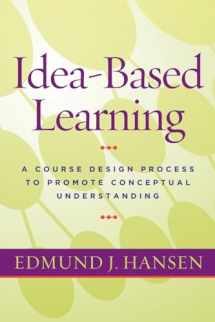
Idea-Based Learning
Book details
Summary
Description
Synthesizing the best current thinking about learning, course design, and promoting student achievement, this is a guide to developing college instruction that has clear purpose, is well integrated into the curriculum, and improves student learning in predictable and measurable ways.
The process involves developing a transparent course blueprint, focused on a limited number of key concepts and ideas, related tasks, and corresponding performance criteria; as well as on frequent practice opportunities, and early identification of potential learning barriers.
Idea-based Learning takes as its point of departure the big conceptual ideas of a discipline that give structure and unity to a course and even to the curriculum, as opposed to a focus on content that can lead to teaching sequences of loosely-related topics; and aligns with notions of student-centered and outcomes-based learning environments.
Adopting a backwards design model, it begins with three parallel processes: first, identifying the material that is crucial for conceptual understanding; second, articulating a clear rationale for how to choose learning outcomes based on student needs and intellectual readiness; and finally, aligning the learning outcomes with the instructional requirements of the authentic performance tasks.
The resulting syllabi ensure cohesion between sections of the same course as well as between courses within a whole curriculum, assuring the progressive development of students’ skills and knowledge.
Key elements of IBL include:
* Helping students see the big picture
* Building courses around one or more authentic performance tasks that illuminate the core concepts of the discipline
* Clearly identifying performance criteria for all tasks
* Incorporating practice in the competencies that are deemed important for students’ success
* By placing the onus of learning on the student, liberating faculty to take on the role of learning coaches
* Designing tasks that help students unlearn simplistic ideas and replace them with improved understandings
Edmund Hansen expertly guides the reader through the steps of the process, providing examples along the way, and concluding with a sample course design document and syllabus that illustrate the principles he propounds.


We would LOVE it if you could help us and other readers by reviewing the book
Book review



